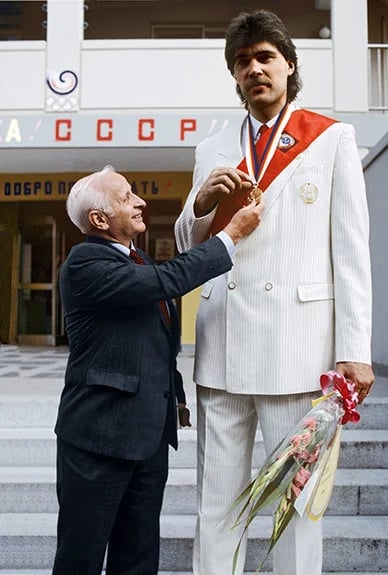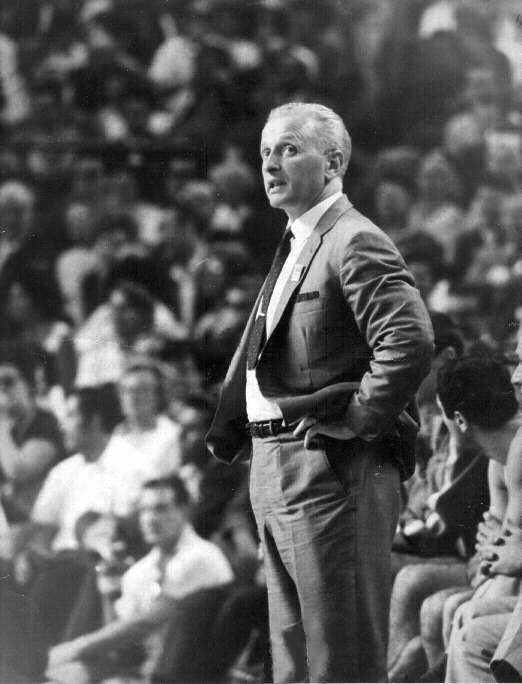
Alexander Gomelsky
"The Silver Fox"
RETROCOACHES
Antreas Tsemperlidis
3/20/20253 min read
Standing on the highest step of the podium in September 1988 at the Seoul Olympics, the Soviet gold medallists were celebrating not only their immortal glory but also something different, tangible, and material. Sabonis, Marčiulionis, Sok, and Tikhonenko, along with the rest of their teammates, hoped that Alexander Gomelsky would keep the promise he had made before the Olympics. Said promise was that if they gave him the one medal missing from his collection – the gold Olympic medal – he would no longer stand in the way of their careers abroad, outside the confines of the –cold ware imposed- Iron Curtain. Indeed, the "Colonel" kept his word, and as of 1989, Soviet athletes were free to choose their next professional destinations beyond the vast borders of the USSR. However, Gomelsky did not reserve this privilege only for his national team players. He was the first to try his luck in a league outside the Soviet system, where he had been the undisputed ruler for the past 35 years.


His initial contact with French club Dijon was unsuccessful, and soon after came an offer from Spain, specifically the Canary Islands. Tenerife, which had just been promoted to the first division, was under the ownership of wealthy Arab magnate Amid Achi Fadoul. Fadoul tempted Gomelsky with a blank check and promises of high-profile signings. The Soviet coach, grabbed the chance and moved to the Iberian Peninsula, with the aim to export the mindset and work habits of his triumphant career, ignoring – or perhaps unaware – that the Spanish league was a completely different, fully professional league with local and foreign players, moulded by standards very much unlike those of Gomelsky. He believed however that his methods would be just as effective in Europe, prompted by his undisputed success numbering a staggering six EuroBasket gold medals. The "Colonel" never understood that in Spain, he was simply the coach of a poor team, not the most powerful man in basketball as he once was in the Soviet Union. His exhaustive training regime on Tenerife's sandy beaches, that were intended to mimic the mountain runs at Belmeken, might have been effective in the era of Jan Krumins and Sergei Belov, but they were no longer enough in the evolving world of basketball. As Tenerife had a poor start to the league, Gomelsky did what he knew best: he contacted some of his national team players, asking them to play for him again. They all turned him down. The "Boogeyman" no longer scared them, and none were willing to endure Gomelsky's grueling training methods again. The era when a simple phone call from the Silver Fox translated to a non-negotiable transfer to CSKA Moscow was over


The shock was significant, but the "Colonel" did not give up. He thought he had found a solution and proceeded to then call his friend, Spanish national team coach Antonio Díaz-Miguel, asking him to mediate so that the international players from Real Madrid and Barcelona could join Tenerife. When Díaz recovered from his laughter and actually realized Gomelsky was serious about it, he responded, disappointing him: "Sasha, you could do that in Russia, but in Spain, we don't work like that." By the time the "Colonel" accepted that he was no longer the dominant figure in the game, Tenerife was in the relegation zone. He was eventually fired after a loss to Taugrés, during which his team blew a 29-point lead! Rumor had it that his players, fed up with his quirks, blatantly showed indifference in the second half.
"We are great players, Gomelsky is a great coach, together we are invincible." One of the many myths about the "Colonel" is that he made his USSR players chant this during the breaks of their exhausting training sessions. In the Soviet Union, thrived one of the greatest coaches in the history of the sport.
Operating inside a world of his own making, isolated and disconnected from the rest of Europe, basketball had in the end outgrown him. Europe was unwilling to embrace the man with the cunning eyes, Alexander Yakovlevich Gomelsky.


